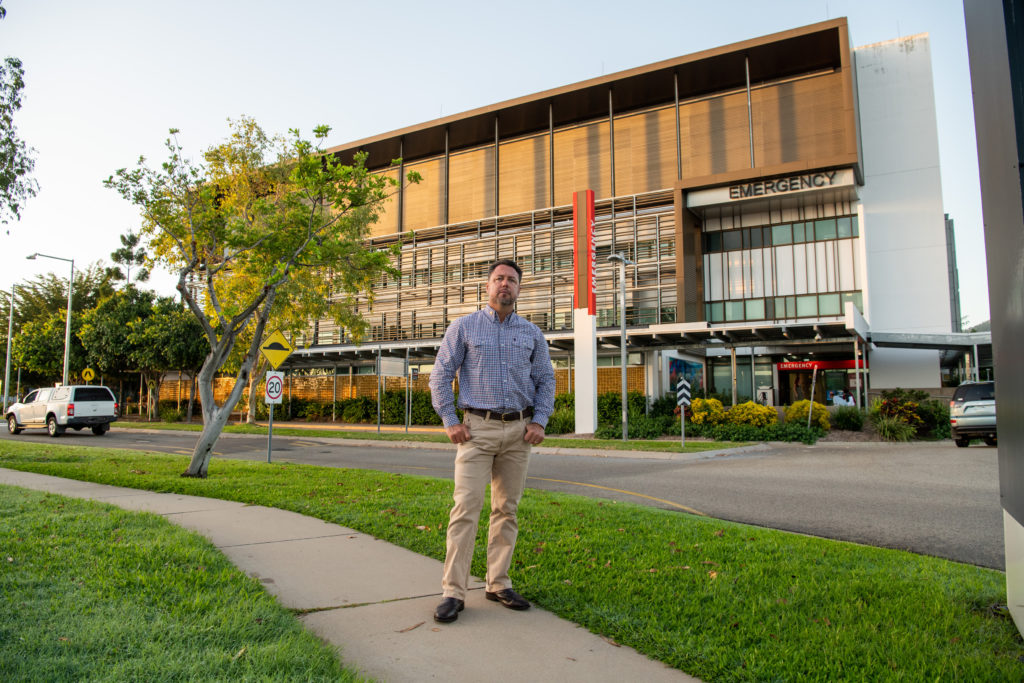Regional patients at a loss from inadequate travel subsidy

State Member for Hinchinbrook and KAP Deputy Leader, Nick Dametto.
1 February 2023
Thousands of regional Queenslanders who travel vast distances to receive medical treatment unavailable to them in their hometowns are being let down by Queensland Health which has not increased the Patient Transport Subsidy Scheme (“PTSS”) for the past 10 years, Katter’s Australian Party MPs have said.
Under the PTSS, patients can apply for a subsidy to assist with travel costs incurred accessing their medical treatment, with the going rate amounting to 30 cents per kilometre for the use of a private vehicle and $60 per night for overnight accommodation.
The subsidy amounts have not been updated for 10 years, with the last increase made in 2013 when the subsidy was doubled from 15 cents per kilometre to 30 cents per kilometre.
Despite an investigation into the scheme by the Queensland Health Ombudsman (QHO) in 2017, Queensland Health has failed to review the subsidy.
At the time, the QHO found that Queensland Health’s failure to act on many prior recommendations to improve the PTSS had been a significant administrative failure.
KAP Deputy Leader and Hinchinbrook MP Nick Dametto said that in his electorate, many patients were forced to travel to either Cairns or Townsville for specialist medical care.
He has today launched the KAP’s formal calls for the PTSS payment rates to be doubled, with the travel allowance increasing to 60 cents per kilometre and overnight accommodation subsidy increasing to $120.
“A typical journey from Ingham to Townsville is about 220 kilometres for a round trip. For months, diesel has been over $2 per litre so it is easy to see what a huge financial burden this must be for people who are already suffering hardship due to their ill health.
“The average cost of diesel back in 2013 was less than $1.60 per litre, meaning we are paying much more per litre now and yet the subsidy does not reflect that increase.
“Over five years ago the Ombudsman recommended that the Government take urgent action to ensure the scheme was more equitable, but it seems Queensland Health have chosen to ignore that recommendation.”
Hinchinbrook resident Eric Darby, who has suffered with blood cancer since 2013 said currently the subsidy barely covered his fuel costs.
“Since 2013, I have travelled over 50,000 kilometers for treatments and appointments including overnight motel stays which are subsidised at $60 per night.
“With a diagnosis of a terminal illness you can never miss treatment, so we just have to find the money somewhere, meaning we miss out on holidays and other things.
“I believe a reasonable subsidy would be doubling the rates,” Mr Darby said.
The PTSS in Queensland was boosted by $2.5 million in the 2022/23 budget to a total of $99.7 million but that isn’t reflected in the subsidy rates available to patients.
Meanwhile, earlier this year the New South Wales government announced that it would increase its equivalent travel subsidy scheme to $140 million. Since June, the travel rebates for people in regional parts of the State who have to travel more than 100 kilometres for medical care, were almost doubled from 22 cents to 40 cents per kilometre. The overnight accommodation rebate in New South Wales was increased to a flat rate of $75 and up to $120 for patients who spend more than seven nights away from home.
Member for Hill Shane Knuth said the PTSS needed to be reviewed and a more efficient system put in place.
“This has been a long-standing issue in my electorate, and I have raised it a number of times in Parliament and directly to the Minister,” Mr Knuth said.
“It is about time the Government understands that the issues regional Queenslanders face in just getting access to health services are far different to those in capital cities.”
KAP Leader and Traeger MP Robbie Katter said the Queensland Government had two choices: provide a level of medical care in the regions that was on par with the cities or, where this not possible, ensure those travelling to access such care were supported.
Mr Katter said rural and remote Queenslanders should not be classed as second-class citizens, and that the outdated PTSS was not fit for purpose in 2023.
“Making sure the PTSS is fair and realistic is the least the Palaszczuk Labor Government can do when it comes to rural and regional health,” he said.
“At KAP we are all about ensuring the regions are liveable and that involves having the most important services, like dialysis and CT scanners and certain specialists, available on our doorstep.
“Where such immediate access is not possible, there is an onus on the Government to remove barriers for those seeking that care and the most obvious of these is the cost burden.
“We’re asking for a drop in the ocean in comparison to what the Government plans to sink into the 2032 Brisbane Olympics and, frankly, its offensive we even need to ask.”
-END-





